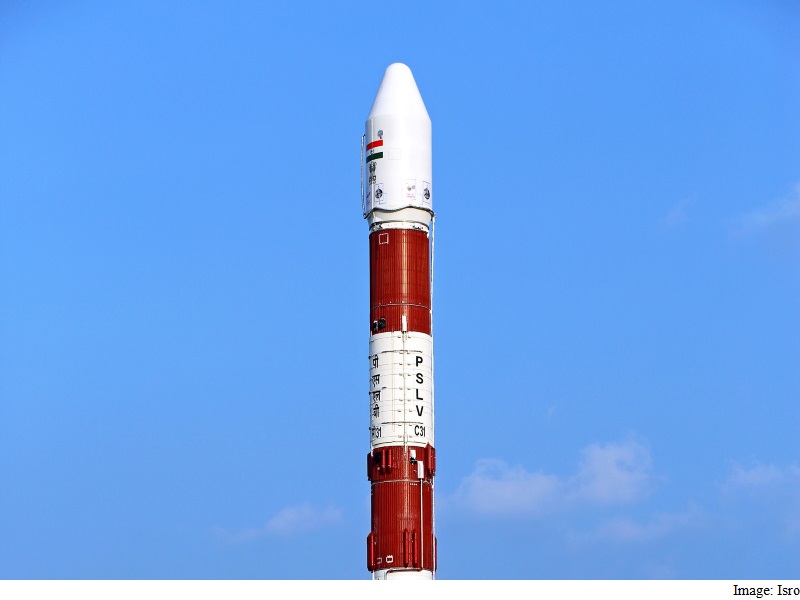- Home
- Science
- Science News
- IRNSS 1E Navigation Satellite Successfully Launched by Isro
IRNSS-1E Navigation Satellite Successfully Launched by Isro

India's successful launch - its first this year - has now moved it closer to joining a select group of nations possessing their own satellite navigation systems.
The Indian Regional Navigation Satellite System (IRNSS) consists of a constellation of seven satellites of which five - IRNSS-1A, IRNSS-1B, IRNSS-1C, IRNSS-1D and IRNSS-1E-have been put into orbit till date.
Exactly at 9:31am, the 44.4-metre high Polar Satellite Launch Vehicle (PSLV) rocket weighing 320 tonnes blasted off into the morning sky with an orange flame tailing it.
Gathering speed every second, the rocked zoomed ahead amid cheers of Isro officials and a media team assembled at the rocket port in Sriharikota.
At the rocket mission control room, Indian space scientists with bated breath remained glued to their computer screens to watch the rocket escape the earth's gravitational pull.
Just over 19 minutes into the flight, the PSLV rocket detatched from IRNSS-1E.
Soon after the ejection into the orbit, the satellite's solar panels were deployed.
The satellite's control was taken over by the Mission Control Facility (MCF) at Hassan in Karnataka.
The MCF will manage the satellite's orbit and fire the on-board motors till it is placed in its slotted orbit.
The Indian space agency's officials earlier told IANS that the concept of IRNSS has been proved a success by the signals received from the first four orbiting navigation satellites.
According to officials, two more navigation satellites will be launched soon to complete the launch of seven satellites required for a fully functional system. The IRNSS system also includes two satellites on the ground as stand-by.
Each satellite costs around Rs. 150 crores while the PSLV-XL version rocket costs around Rs. 130 crores. The seven rockets would involve an outlay of around Rs. 910 crores.
The space agency's officials said IRNSS system was unique in the sense that it comprises of only seven satellites while other similar systems in the world have more than 20 satellites.
However, while other systems are global, the Indian system is regional in nature.
Once fully operational, the IRNSS will provide accurate position information service to users across the country and the region, extending up to an area of 1,500 km. While Isro is silent on the system's strategic application, it is clear that the IRNSS will be used for defence purposes as well.
The IRNSS is similar to the global positioning system (GPS) of the US (24 satellites), Glonass of Russia, and Galileo of Europe, China's Beidou.
While GPS and Glonass are fully functional global systems, the Chinese and the Japanese systems are offering regional coverage whereas Europe's Galileo is yet to be operational.
The IRNSS will provide two types of services - standard positioning service and restricted service.
The former is provided to all users whereas the later is an encrypted service for authorised users.
For the latest tech news and reviews, follow Gadgets 360 on X, Facebook, WhatsApp, Threads and Google News. For the latest videos on gadgets and tech, subscribe to our YouTube channel. If you want to know everything about top influencers, follow our in-house Who'sThat360 on Instagram and YouTube.
Related Stories
- Samsung Galaxy Unpacked 2025
- ChatGPT
- Redmi Note 14 Pro+
- iPhone 16
- Apple Vision Pro
- Oneplus 12
- OnePlus Nord CE 3 Lite 5G
- iPhone 13
- Xiaomi 14 Pro
- Oppo Find N3
- Tecno Spark Go (2023)
- Realme V30
- Best Phones Under 25000
- Samsung Galaxy S24 Series
- Cryptocurrency
- iQoo 12
- Samsung Galaxy S24 Ultra
- Giottus
- Samsung Galaxy Z Flip 5
- Apple 'Scary Fast'
- Housefull 5
- GoPro Hero 12 Black Review
- Invincible Season 2
- JioGlass
- HD Ready TV
- Laptop Under 50000
- Smartwatch Under 10000
- Latest Mobile Phones
- Compare Phones
- Redmi Turbo 4
- Vivo Y200+
- Lava Yuva 2 5G
- OnePlus Ace 5
- OnePlus Ace 5 Pro
- Oppo A5 Pro 5G
- Vivo Y29 5G
- Honor Magic 7 RSR Porsche Design
- Asus Zenbook S 14
- MacBook Pro 16-inch (M4 Max, 2024)
- Honor Pad X9 Pro
- Honor Pad V9
- boAt Enigma Gem
- boAt Enigma Daze
- Sony 65 Inches Ultra HD (4K) LED Smart TV (KD-65X74L)
- TCL 55 Inches Ultra HD (4K) LED Smart TV (55C61B)
- Sony PlayStation 5 Pro
- Sony PlayStation 5 Slim Digital Edition
- Blue Star 1.5 Ton 3 Star Inverter Split AC (IC318DNUHC)
- Blue Star 1.5 Ton 3 Star Inverter Split AC (IA318VKU)
















